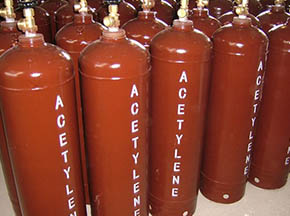
Acetylene is manufactured through the reaction of Calcium Carbide and water inside a hopper like container which is called a generator. There after it is purified, pressurized to 16 kg/cm2 at 15oC and bottled into cylinders.
Acetylene is an extremely unstable compound and the physical nature of Acetylene changes under pressure. After it reaches 15 psig it gradually becomes more susceptible to dissociate without the addition of Oxygen. The word dissociate as applied to Acetylene means that the gas, which is composed of carbon and Hydrogen will, under certain circumstances, separate and cease to be Acetylene but become carbon in the form of lampblack and Hydrogen in the form of a gas
While dissociating, it will give off considerable quantities of heat, and create extremely high pressure within piping and hoses. For this reason, Acetylene is always stored and transported after dissolving it in a liquid. Ellenbarrie uses Acetone for dissolving Acetylene. Hence the name Dissolved Acetylene or DA.
During welding the usage of DA it is never advisable to adjust an Acetylene regulator discharge pressure to greater than 15 psig because dissociation can take place in the welding hose. Acetylene produces one of the hottest flames known, having temperatures of 4000oF when burned with air and approximately 6000oF when burned with Oxygen.
All Hydrogen storage and handling equipment must be equipped with a common grounding system to prevent the buildup of static electricity and a resultant spark. Because of the extremely low energy required to ignite flammable mixtures of Hydrogen gas, one must exercise caution when using Hydrogen around electrical equipment. All flexible hoses and piping systems must be electrically grounded.Most Ellenbarrie locations store Acetylene in cylinders and that is why we should be familiar with the safe handling procedures for Acetylene cylinders.
The possibility of an explosion with air is even greater with Acetylene than most of the other gases. Almost any mixture of Acetylene and air is flammable. Concentrations of Acetylene between 2.5% (Lower Explosive Limit) and 100% (Upper Explosive Limit) by volume in air are easy ignited by a low-energy spark and may cause an explosion. Smoking, open flames and other sources of ignition must not be permitted in Acetylene manufacturing and storage areas.
Acetylene cylinders are equipped with fusible-metal safety plugs which melt at about 100oC (212oF). These plugs, usually hexagon shaped, are threaded into the cylinder head and bottom on most of the cylinders. They will melt and release the pressure from an Acetylene cylinder rather than have the cylinder explode if exposed to a fire. Fires involving Acetylene occur occasionally at fusible metal pressure relief plugs at the tops and bottoms of cylinders, commonly due to hot metal or slag being dropped on the fusible plugs. When the fusible plug ruptures, a large volume of Acetylene will rush out, creating a “roaring” sound. The flame may extend a foot or two away from the cylinder until the pressure is reduced. In some cases, the other end of the cylinder may develop a coating of frost.
All piped Acetylene systems and associated equipment must be grounded. Electrical equipment must be non-sparking or explosion-proof. Leak check should be done using soapy water. Use a backflow prevention device in any piping containing Acetylene gas. Copper, silver, and mercury and their salts, compounds, and high-concentration alloys can form explosive compounds with acetylene called Acetylides. Brass containing less than 65 percent copper and certain nickel alloys is generally acceptable for use in acetylene service but may not be adequate if high corrosion or excess moisture is present.
Store DA cylinders outdoors or in well ventilated areas away from heat sources. Oxidizers must be stored at least 20 feet away unless separated by a fire wall. Be certain that the regulator-to-cylinder valve, hose-to-regulator and torch-to-hose connections are leak tight before starting work.
Acetylene gas is lighter than air, colorless and has an odor similar to that of fresh garlic.Acetylene is not poisonous but it can displace the air from the atmosphere in a confined space and cause asphyxiation.
CATEGORY AND DETAILS
Chemical Name :- Acetylene
Specification
IS 308: 1988
Offered Purity
96%
Cylinder Colour
Maroon
Packaging
The cylinders are available in various capacities.
Application
Acetylene can be used as fuel gas. Of all the fuel gases, Acetylene produces the hottest flame (3200°C) when burned with Oxygen. It provides high productivity, low Oxygen consumption and safe use within confined spaces.
Read More